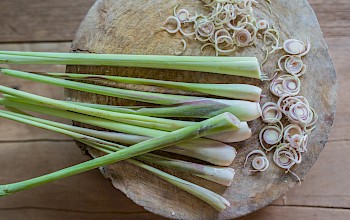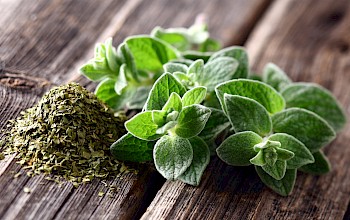Ginger: Calories and Nutrition Analyse
How many calories in ginger?

Nutrition Facts
GingerServing size:
medium size ginger (110 g) change
5g10g15g20g30g40g50g60g80g100g120g140g160g180g200g220g250g300g350g400g450g500g600g700g800g900g1000g
1oz2oz3oz4oz5oz6oz7oz8oz10oz12oz15oz20oz25oz30oz35oz40oz50oz
Amount Per Serving:
100g of ginger contain about 80 calories (kcal).
Calories per:
ounce
| one ginger
| tablespoon
| teaspoon
| slice
| cup, chopped
To show you what does it mean, a medium size ginger (110 g) contain about 88 calories.
This is about 4% of the daily caloric intake for an average adult with medium weight and activity level (assuming a 2000 kcal daily intake).
Scroll down for details and nutrition tables.
To visualize how much 88 kcal actually is, keep in mind that the calorie content of ginger is similar to that of, for example:
- 1.5 apples
- 1 glass of Coca Cola (220 ml glass)
- 0.5 slice of cheese
- 0.5 slice of bread
- 0.5 glass of milk
- 4.5 cubes of sugar
Take a quick look at the tables below for detailed information about ginger nutrition.
100g of Ginger
Nutrition
- Calories80
- Carbs Total17.77 g
- Dietary fiber2 g
- Fat0.75 g
- Protein1.82 g
Vitamins
- Vit B3 (Niacin)0.75 mg
- Vit B50.203 mg
- Vit B60.16 mg
- Vit B9 (Folic acid)11 mcg
- Vit C5 mg
- Vit E0.26 mg
- Vit K0.1 mg
Minerals
- Potassium415 mg
- Phosphorus34 mg
- Magnessium43 mg
- Calcium16 mg
- Sodium13 mg
- Iron0.6 mg
- Zink0.34 mg
Unlocking the Nutritional Secrets of Ginger
Ginger, a popular spice with a fiery flavor and a plethora of health benefits, is more than just a kitchen staple. It's a superfood that has been used for centuries in various cultures for its medicinal properties. But what about its nutritional content? How many calories are in ginger, and what does it offer in terms of vitamins and minerals? Let's dive into the fascinating world of ginger nutrition and discover why this root deserves a spot in your diet.
Ginger Calories and Macronutrients
When it comes to ginger calories, it's quite low in energy but high in flavor. A 100-gram serving of ginger contains approximately 80 calories, making it an excellent addition to a weight management diet. But ginger is not just about low calories; it's packed with essential nutrients that contribute to its health benefits.
The carbs in ginger amount to about 17.77 grams per 100 grams, with a dietary fiber content of 2 grams. This moderate carbohydrate content, coupled with dietary fiber, makes ginger a good option for blood sugar regulation.
When it comes to fats, ginger contains a minimal amount, with only 0.75 grams of fat per 100 grams. This includes a negligible amount of saturated fats, making ginger a heart-healthy choice.
As for protein in ginger, it provides 1.82 grams per 100 grams. While not a high-protein food, ginger adds a nutritional boost to meals and can contribute to the overall protein intake when combined with other protein sources.
Vitamins and Minerals in Ginger
Ginger is not just about macronutrients; it's also rich in vitamins and minerals. It contains vitamin C, which is essential for immune function, skin health, and iron absorption. With 5 mg of vitamin C per 100 grams, ginger can help meet your daily vitamin C needs.
The spice is also a good source of magnesium (43 mg), potassium (415 mg), and phosphorus (34 mg), which are vital for heart health, muscle function, and bone health. Additionally, ginger provides a modest amount of iron (0.6 mg) and calcium (16 mg), contributing to the overall mineral intake necessary for a healthy body.
Other notable nutrients in ginger include vitamin B6, niacin (vitamin B3), and pantothenic acid (vitamin B5), which play crucial roles in energy metabolism and brain health.
The Role of Ginger in a Healthy Diet
Incorporating ginger into your diet can offer numerous health benefits, including anti-inflammatory effects, nausea relief, and improved digestive health. Its low calorie and high nutrient profile make it an excellent addition to a balanced diet, whether used fresh, dried, or as a spice.
Adding ginger to teas, smoothies, or meals not only enhances flavor but also boosts nutritional value. Given its health-promoting properties and nutritional content, ginger is more than just a spice; it's a functional food that supports overall well-being.
In conclusion, ginger is a nutritional powerhouse with a low calorie count and a rich profile of vitamins and minerals. Whether you're looking to spice up your meals or improve your health, ginger offers a unique combination of flavor and nutrition that can benefit everyone.
How many calories are there in 1, 2, 3, or 5 servings of ginger roots?
- Medium size ginger (110 g)88 kcal
- Tablespoon of ginger (15g)12 kcal
- Teaspoon of ginger (5g)4 kcal
- Slice of ginger (4g)3 kcal
- Ginger cup, chopped (113g)90 kcal
- Ounce (oz) of ginger23 kcal
- Half of medium size servings of ginger44 kcal
- Small size serving of ginger (88g)70.4 kcal
- Big size ginger (143g)114.4 kcal
- Two medium size servings of ginger roots176 kcal
- Three medium size servings of ginger roots264 kcal
- Four medium size servings of ginger roots352 kcal
- Five medium size servings of ginger roots440 kcal

Similar calories number have:
See also:
Read this:
- How many calories does mint have?
- Calories in handful of tarragon leaves
- Calories in tablespoon of tarragon
- Calories in bunch of tarragon leaves
- How many carbs (carbohydrates) in thyme?
- How much fat in turmeric?
- How much protein in apricot?
- What is weight of avocado?
- Banana calories per ounce (oz)
- Blackberries calories per serving size



Add comment